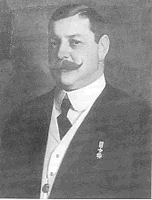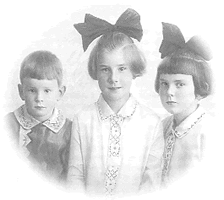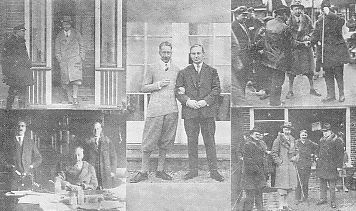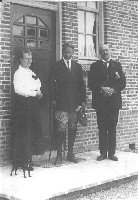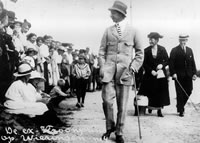Twice Louis Charles (1867-1922 and 1893-1970), mayors of the island of Wieringen
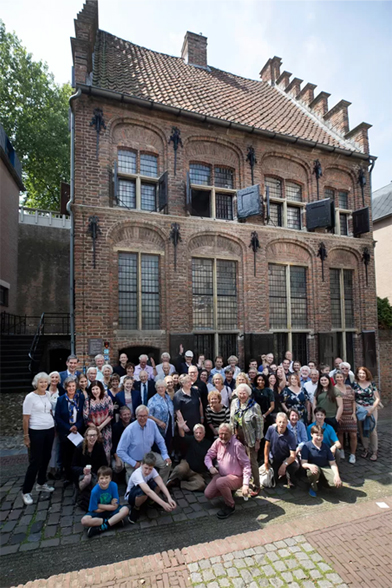
Mayors of the island of Wieringen
| contribution by: Marius Kolff (CBCD XVIIw4) |
| In the Genealogy: Louis Charles (B XVf) and his son Louis Charles (B XVIf) |
The stay of the German Crown Prince on the island of Wieringen and the two mayors Kolff is an interesting item on which a lot can be written, about the prince but also on the Kolff Family. For the time being: here at this first page an excerpt from the Genealogy (B, last generation), at the second page an article from ‘Het Leven’, 1927, and at that and following pages text taken from the historical site of Wieringen (link to that site at those pages) and a remark from the webmaster.
XVf. Louis Charles Kolff (R.O.N.) (History), born Arnhem 25 Dec. 1867, board member/employee of family owned Suikerfabriek Kandang Djatie at Kraksaän, Residentie Probolingo, Ned. East Indies 1888-1889, wine trader at Amsterdam 1891-1892, volontair at secretary and member of council Wassenaar 1893-1896, mayor of Wieringen 1896-1902 and 1920-1922, member Prov. Staten Noord-Holland 1900-1902, deceased Hippolytushoef 27 June 1922, married Bonn 2 Apr. 1891 Jacoba Theodora Auguste Hageman, born Zweibrücken (Bayerische Pfalz) 4 Feb. 1866, deceased Bergen (N.-H.) 4 May 1940, daughter of Joannes Marie and Bertha Hancke.
From this marriage:
1. Gualtherus Frederik Adriaan Kolff, born Amsterdam 1 Apr. 1892, director N.V. Handelsmij. Kukenheim & Co. at Semarang, deceased Amsterdam 23 Apr. 1955, married 1st Arnhem 4 Sept. 1915 Cornelia Sara Bondam, born ‘s-Hertogenbosch 6 Aug. 1887, deceased Arnhem 15 Sept. 1918, daughter of Mr. Adrianus Cornelis and Jkvr. Cornelia Sara Tjarda van Starkenborgh Stachouwer; married 2nd Georgetown (Penang, Malakka) 25 Dec. 1919 (divorce registered Soerabaja 11 Sept. 1935) Maria Lina Leerink, born Doetinchem 17 Jan. 1893, deceased Oosterbeek 9 Dec. 1978, daughter of Gerard and Johanna Hendrika Hendriks; she remarried Soerabaja 12 Jan. 1937 Hendrik Nijk and married 3rd Amsterdam 8 Sept. 1949 Albert Johannes Coops.
3. Mr. Berthus Joan Karel Kolff (Board 1926-1931) (Board 1938-1943), born Wassenaar 20 Oct. 1894, medewerker Nationale Bankvereeniging 1920, exec.-director Nationale Bankvereeniging office Dordrecht and district exec.-director Nationale Bankvereeniging district Zuid-Holland-Zeeland 1925, exec. director provincial offices Rotterdamsche Bankvereeniging 1933, exec.-director Rotterdamsche Bankvereeniging N.V. 1938, member board Bond voor den Geld- en Effectenhandel in de Provincie, member Raad van Bijstand Rotterdamsche Bankiersvereeniging, consul-general of Finland at Rotterdam 1939, reserve 1e luitenant velartellerie, consul-general of Finland at Rotterdam, deceased there 10 Sept. 1942, married Rotterdam 3 May 1921 Tonia Adriana Kolff (see CBCC XVs.2), born Rotterdam (Kralingen) 24 May 1899, deceased Rotterdam 25 Sept. 1983, daughter of Adrianus Antonie and Luise Johanna Elisabeth Schultz.
XVIf. Louis Charles Kolff (R.O.N.) (Board 1931-1938) (History), born Wassenaar 1 June 1893, mayor of Wieringen 1922-(1942), 1945-1958, res.-1e luitenant art., deceased Zutphen 7 June 1970, married Rheden (De Steeg) 28 Aug. 1918 Jkvr. Cornelia Maria van Heurn, born ‘s-Hertogenbosch 13 July 1895, deceased Zutphen 17 Jan. 1967, daughter of Jhr. Nicolaas Cornelis and Jeanne Cornélie Pichot Lespinasse.
From this marriage:
1. Nicoline Cornelia Jacoba Kolff (Board 1947-1950), born Velp 15 June 1919, last adjunct-directrice Bejaardencentrum Den Bouw at Warnsveld, deceased Zutphen 21 June 1998.
3. Mr. Louis Charles Kolff (Board 1954-1969), born Hippolytushoef 23 March 1924, former municipal secretary of Bloemendaal, former Secretary Chamber of Commerce and Industry Curaçao and managing director Avila Beach Hotel Curaçao, deceased Utrecht 12 Feb. 2005, married Curaçao 13 Jan. 1970 Trijntje van der Plas, born Katwijk aan Zee 27 Dec. 1926, manager Avila Beach Hotel Curaçao, daughter of Cornelis and Neeltje Blonk.
Marius (CBCD XVIIw4), webmaster, and at that time Secretary (now President) of the Association, went to the funeral ceremony of Louis Charles ’the 3rd’ (here at B XVIf3), wants to add this personal note (being a dog lover himself, and recognizing similarities):
At his funeral in 2005 at Bloemendaal Louis was remembered by Bloemendaal people as the man known there for many years as ’the man and his dog’; a man always together with his dog, where ever he went: some of that was remembered as Louis and his dog walking every day for hours in the dunes of Bloemendaal. This was before he left Bloemendaal and moved to Curaçao, where he got married. But his last wish was to be buried in the dunes of Bloemendaal, because of the good times he spent there, with his dog…
From ‘Het Leven’, 1927
“The German former Crown Prince visiting Wieringen.
That the former Crown-Prince can not forget Wieringen, where he lived for so long, is understandable. This week he came back to visit his old acquaintances. For the photographer of Het Leven, who was present ofcourse, the prince agreed to pose with mayor Kolff, which picture can be seen here in the middle. Further, at top-left: the prince at his former residence, the parsonage of Oosterland, at top-right: with some of his acquaintances at Den Oever, at bottom-left a unique picture at the townhall with the mayor and the town secretary, and at bottom-right with blacksmith Leyt, an old friend where the prince, while at Wieringen has been working so very often.”
From The History of Wieringen
(English translation from article in: the History of Wieringen – see link on next page; translation by webmaster of this site)
After the armistice of 1918, which de facto meant the defeat of Germany, and after the socialist uprisings in Germany, the German emperor and his son the crown prince, Friedrich Wilhelm V.E.A. Von Hohenzollern fled to the Netherlands. Both asked for political asylum in the Netherlands which was granted without much difficulty. However a problem for the Dutch gouvernment was where to find residence for the exiles. Wieringen was then, in 1918, still truly a rather remote island and for that reason a proper place of exile for the crown prince.
On the 22nd of November 1918 the prince and his household arrived on the island and moved in the former vicarage in the village of Oosterland. For a short period Wieringen was focus of world news: photo’s of the prince welding horseshoes at the smithy of his friend blacksmith Luyt, on the Nieuwstraat at Hippolytushoef, went all over the world.
After almost five years (November 10, 1923) the prince left the island. The Stresemann gouvernment of Germany permitted him to return to his fatherland. For some time the prince had the idea that he could restore the old regime, but this did not succeed (This was the period of the hyperinflation: Germany was bankrupt: an opportunity for a strong regime).
Without anyone (except for the Dutch gouvernment, that assisted him) knowing it he left Wieringen. He left behind an island with – as is being said – some of his illigitimate children and a lot of material for stories about which one could talk for several decades. Famous, for example, is the story of the paper bathing suits he handed out to some of the Wieringen young women. When these women tried these bathing suits out in the water they disolved, meanwhile the prince was watching with a lot of interest.
After his return to Germany the prince never played the prominent part he had in mind for himself. Up to his death in 1951 he lived a rather quiet life, a representative of a time that was over and which would never return. During World War II he is said to have tried to use his influence with the German authorities to free his old friend mayor Kolff from imprisonment. Kolff was held in detention at Haren (Brabant), together with other mayors from the province of North-Holland. Even if the crown prince has spoken to Seyss-Inquart, Rauter, or other highly ranked Germans, it did not lead to the desired result. Kolff was not released any earlier.
Almost 80 years after his sudden departure from Wieringen the crown prince is once again in the (local) news: the municipality is investigating wether the stay of the crown prince on the island can be used for promotional activities to boost tourism at Wieringen. Ideas are to create a permanent exposition and to set up a touristic route along points of interest regarding the prince’s stay at Wieringen. Once more is known it will be mentioned at the site of Wieringen (see the link below).
Kolff was interned by German authorities in 1942; he returned to Wieringen after the liberation in 1945 and remained mayor until 1958. At the website History of Wieringen (WWII) is recorded about this:
On July 13th 1942 the mayor of Wieringen, Louis Charles Kolff Jnr. was requested to come to Haarlem for a meeting with the governor for the North-Holland province. When he arrived there he was arrested, along with 9 other mayors from North-Holland. He was taken hostage in the Major Seminary of Haaren (where more prominent Dutch citizens were held hostage, just as in the better-known St. Michielsgestel, which wasn’t far from Haaren). Members of the NSB, the Dutch National Socialist Movement, were appointed in their place.
Mayor Kolffs wife tried to use their friendship with the German ex-crownprince, dating from the latter’s exile on Wieringen, to get her husband out of prison. The personal secretary of the prince wrote a letter stating that the crownprince was very sad to learn that the Kolff family hadn’t been spared from the rages of war. He promised to use his influence, but it is unknown if he ever did, or still had the influence he claimed.
Mayor Kolff was released before the end of the war, but was the only hostage who wasn’t allowed to return to his home. The Germans wouldn’t even let him enter the province. Why he was treated in this way is unknown.
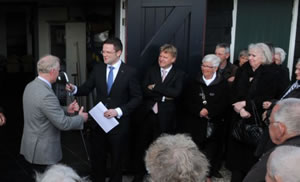 March 31, 2012, on the island of Wieringen the visitors’ centre of the Wieringer Island Museum Jan Lont. was openend. On the occasion of this opening Cees van der Sluis donated a walking stick with silver handle of the late Louis C. Kolff jr. (B XVIf). At this opening Van der Sluijs, who is executeur-testementair of Coby Kolff, see below here, was surprised happily to find out that the museum has a special show-case about the two Mayors Kolff on the island. He remarks: “Day before yesterday I was present at the opening of the Wieringer Island Museum and and that occasion a donated the walking stick with silver handle of Mayor L.C. Kolff jr. following earlier donations of items of the Kolff Family with a clear Wieringen connection to the museum. Much to my surprise one had already on display a show-case on the Kolff Family which exhibited amongst other things our donated items. (..) A true memorial to this branch B of the Kolff Family which ended with the death of the last born child of this branch, Coby Kolff (B XVIf2) (..)”
March 31, 2012, on the island of Wieringen the visitors’ centre of the Wieringer Island Museum Jan Lont. was openend. On the occasion of this opening Cees van der Sluis donated a walking stick with silver handle of the late Louis C. Kolff jr. (B XVIf). At this opening Van der Sluijs, who is executeur-testementair of Coby Kolff, see below here, was surprised happily to find out that the museum has a special show-case about the two Mayors Kolff on the island. He remarks: “Day before yesterday I was present at the opening of the Wieringer Island Museum and and that occasion a donated the walking stick with silver handle of Mayor L.C. Kolff jr. following earlier donations of items of the Kolff Family with a clear Wieringen connection to the museum. Much to my surprise one had already on display a show-case on the Kolff Family which exhibited amongst other things our donated items. (..) A true memorial to this branch B of the Kolff Family which ended with the death of the last born child of this branch, Coby Kolff (B XVIf2) (..)”
Download (Adobe document, and available in Dutch language only) here the speech of Van der Sluijs he gave when he donated the walking stick in March 2012. Some newspaper (internet) articles about the opening of the Museum are mentioned here (Dutch): the pages of Noordkop Nieuwsnd Wieringer Nieuws. In Wieringer Nieuws it says that the Family Kolff died out, which is of course a mistaker, given from the fact that there was the mentioning of the dying out of the branch B of the Kolff Family, of which the mayor’s family were the last remaining members. This branch is remembered well in recent years: the year 2011 when the branch died out the Kolff Family Association presented the biography of Dirk Hendrik Kolff (check for the description of this biography this page: ‘Driftig van Spraak, levendig van gang‘) which can be obtained through the web shop of the Kolff Family Association.
Remark from the webmaster:
Louis Charles Kolff Sr. was mayor from 1896 to 1902 and from 1920 to 1922. It has been said that he was asked back to this post in 1920 because of the stay of the German crown prince on the island (November 1918 – November 1923, short visits after that such as in 1927). Louis Charles Sr. died in 1922 and his son Louis Charles Jr. was appointed mayor of Wieringen to succeed his father (he was mayor of Wieringen: 1922-1942 and 1945-1958).
See also: 15 Mayors
